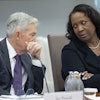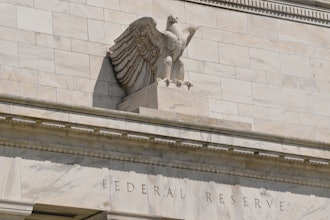
More wild market swings appeared imminent Thursday, with U.S. stocks heading sharply lower after the largest single-day point gain in history for the Dow.
Slowing economic growth globally and a partial U.S. government shutdown heading into its sixth day whipsawed markets from Europe to Asia. Dow futures pointed to a 400-point loss less than two hours before the opening bell, following a 1,000-point gain the previous day.
Trading resumed in European markets which had been closed for the Christmas holiday, and the German DAX slid 1.7 percent to 10,447.53. France's CAC 40 gave up 0.1 percent, to 4,619.74. Britain's FTSE 100 fell a full percentage point to 6,616.55.
Futures for the broad S&P futures slumped 1.5 percent to 2,430.50 and the battered Nasdaq, down more than 18 percent in the past three months, slid 1.6 percent, to 6,188.50.
On Wednesday, U.S. markets snapped a four-day losing streak and clocked their best day in more than 10 years as the Dow jumped 5 percent, or 1,086 points, to 22,878.45. Advisers to President Donald Trump said there were no plans to oust Fed chairman Jerome Powell, though his sentiment on the man he nominated, played out it tweets, seem as volatile as the stock markets. Strong holiday sales, up more than 5 percent during the holiday season in the U.S., also lifted spirits in the shortened trading week. Mastercard SpendingPulse said U.S. shoppers spent more than $850 billion this year.
"The question, of course, is whether this is just a snapback bear market rally, or as Trump said, a tremendous opportunity to buy stocks?" Chris Weston of Pepperstone Group Limited said. "We can assess the fundamental drivers, such as poor global economics, the Fed not altering its forward guidance or providing flexibility to the pace of balance sheet normalization, and ascertain nothing has really changed here," he added.
Bloomberg reported that the U.S. will send a government delegation to hold trade talks with Chinese officials in Beijing in the week starting Jan. 7. It cited two people familiar with the matter. This follows a meeting between U.S. President Donald Trump and his Chinese counterpart Xi Jinping in Argentina earlier this month. The two leaders agreed to hold off on additional tariffs for 90 days, to work on disagreements on trade and technology policies.
Nikkei 225 index rebounded 3.9 percent to 20,077.62. It tumbled more than 5 percent on Tuesday before recovering slightly a day later. South Korea's Kospi was less than 0.1 percent higher at 2,028.44. The Shanghai Composite index lost 0.6 percent to 2,483.09. The Hang Seng index was 0.7 percent lower at 25,478.88 while Australia's S&P-ASX 200 jumped 1.9 percent to 5,597.20. Stocks climbed in Taiwan and throughout Southeast Asia.
Benchmark U.S. crude dropped 86 cents to $45.36 a barrel in electronic trading on the New York Mercantile Exchange. The contract posted its biggest one-day gain in more than two years and settled at $46.22 a barrel in New York on Wednesday. Brent crude, used to price international oils, shed $1.11 to $53.36 a barrel.
The dollar fell 0.52 percent to 110.76 yen. The euro rose 0.4 percent to $1.1391.






















